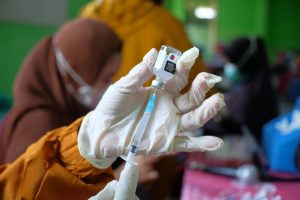Indonesia has approved for emergency use a COVID-19 vaccine produced by the Chinese pharmaceutical company Anhui Zhifei Longcom, the country’s food and drug agency BPOM said yesterday.
“Today, BPOM again announces that we have approved a COVID-19 vaccine product under the trade name Zifivax, which was developed with a recombinant protein sub-unit platform,” BPOM’s head Penny Lukito told a virtual press conference.
Lukito said that that the vaccine had just passed the third phase of clinical trials, which involved a trial in Indonesia involving around 4,000 people. On the basis of this trial, and others in Uzbekistan, Pakistan, Ecuador, and China, the Chinese firm claims that Zifivax has an efficacy rate of 81.4 percent 14 days after the administration of the vaccine.
Indonesia has been among the Southeast Asian nations worst-hit by COVID-19, having notched more than 4.2 million confirmed infections and 142,494 deaths as of yesterday. But the number of daily infections has fallen dramatically in recent months. On October 4, the daily caseload dipped below 1,000 for the first time since June 2020, down from more than 50,000 per day at the peak of the outbreak in July of this year, when Indonesia overtook India as Asia’s virus epicenter.
Since the height of the outbreaks, which prompted the government to impose tight lockdowns in the capital Jakarta and other parts of densely populated Java and Bali, the government of President Joko Widodo has taken other measures to get on top of COVID-19. The country has improved its sourcing of vaccines from China and from other nations, while boosting its previously poor testing and tracing capacities.
The approval of the Zifivax, the fourth Chinese-made vaccine to be cleared for use in Indonesia after the Sinovac, Sinopharm, and CanSino vaccines, is also likely to add to the momentum of the country’s vaccine rollout, which got off to a sluggish start in January due to logistical challenges and difficulties in procuring sufficient vaccine supplies.
While Indonesia has fully vaccinated just a fifth of its population, the third-lowest of the 10 countries of the Association of Southeast Asian Nations (ASEAN), its huge population understates the extent of its distribution campaign. Earlier this week, the country administered its 150 millionth dose of vaccine, nearly three times more than second-placed Thailand, and now the fifth-highest total in the world. In announcing the milestone, Health Minister Budi Sadikin said the country is aiming to complete between 350 million and 400 million shots by January. Ultimately, its goal is to vaccinate all 208.3 million Indonesians over the age of 12.
This growing momentum has permitted the slackening of COVID-19 lockdowns and restrictions, and a graduated process of economic reopening. Since August 23, residents of the capital Jakarta, where nearly half of the city’s population of 10 million are believed to have contracted COVID-19 at one point or another, were finally able to venture out of doors as the city reopened malls, eateries, and places of worship.
Meanwhile, the island of Bali is set to restart international flights for foreign visitors from certain countries starting on October 14, Luhut Binsar Pandjaitan, the coordinating minister for maritime and investment affairs told a virtual press conference earlier this week. International visitors from South Korea, China, Japan, New Zealand, Abu Dhabi, and Dubai will be permitted to travel to Indonesia as long as they remain in quarantine for eight days and undergo health tests.
But perhaps the most telling sign of progress is that the Indonesian tycoons who fleet-footed it to Singapore at the outbreak of the pandemic are now preparing to return to Indonesia, according to a report this week in the Straits Times.
Indonesia isn’t quite out of the jungle yet. As the journalist Matthew Loh noted in an article for Insider magazine late last month, Indonesia is still plagued by the same core issues that made its capital so vulnerable during its summer crisis: “poor data reporting, gaps in medical access, and a lack of access to vaccines.”
All three of these problems are markedly more pressing in Indonesia’s less developed outer islands, where the health infrastructure is especially weak and there are numerous logistical challenges to the distribution of vaccines. Both of these make any likely outbreak potentially much more lethal than that which previously scythed its way across the island of Java.
Indonesia’s continued vulnerabilities suggest that for all its laudable recent successes, its COVID-19 challenge, like that of the region as a whole, has only reached the end of the beginning.

































